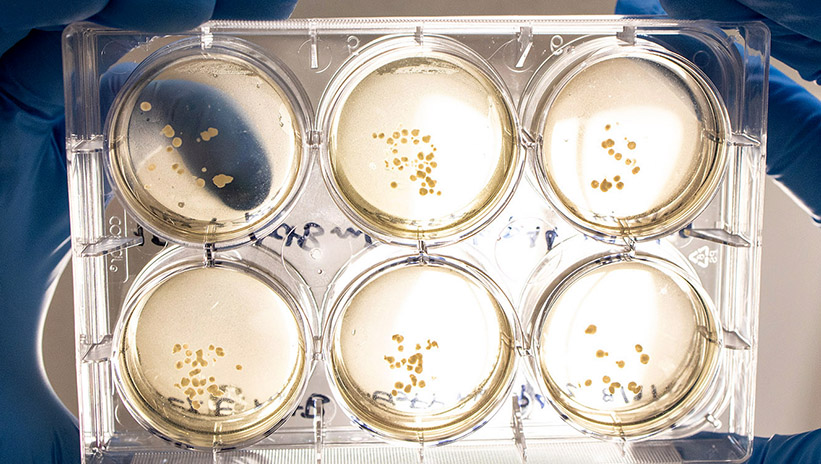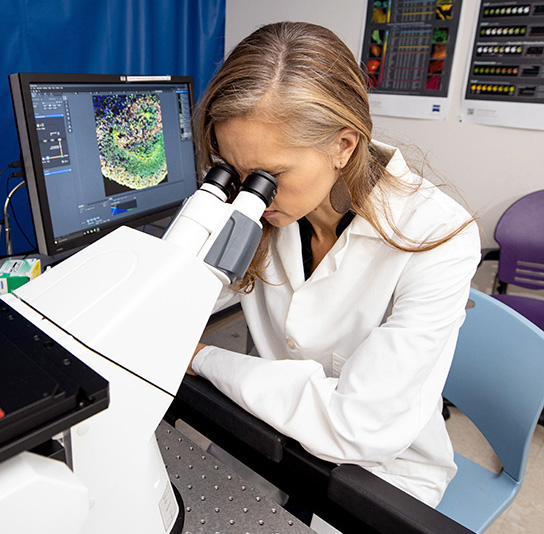Stewards of the Visual Exposition
ECU Researcher Grows Mini Brains to Better Understand Autism Spectrum Disorders
Publisher's note: The author of this post, Rob Spahr, is a contributor to ECU News Services.

When people ask Dr. Karen Litwa what she does for a living, her response is unique.
"I say that I'm a brain builder," she says through a smile.
Litwa, an assistant professor of anatomy and cell biology at ECU's Brody School of Medicine, studies the mechanisms by which the brain cells form connections with one another to share information with each other.
In order to do that, her team grows mini brains in culture dishes.
"We can take a sample from a tissue bank, usually connective tissue from a skin biopsy, and make it into a pluripotent state, which just means it has the capacity to become any type of cell," Litwa explained. "Then using different growth factors, we make these into little spheres that contain the neurons that we're interested in studying."
The mini brains that Litwa grows lack blood vessels and are only about two millimeters in diameter, but they are able to replicate the stages of human fetal brain development, specifically the outer cortex of the brain.

The mini brains recently grown by Litwa's team originated with tissue samples from individuals with neurodevelopmental disorders, such as autism spectrum disorders, so the team could explore how their brains develop differently from people who don't have autism.
"If we know how the brain develops differently in autism spectrum disorders, we can eventually develop therapies for autism spectrum disorders," she said.
Litwa's lab was able to observe differences in neuronal communication in autism patient samples. They are also one of the first labs to apply three-dimensional super-resolution STORM imaging to mini brains, allowing them to visualize synapses in a three-dimensional space.
"It's very exciting to me that we were able to capture the emergence of these neurodevelopmental abnormalities that we haven't been able to view before. It's astounding that we can see this occurring in a culture dish and see this on the microscope," Litwa said. "It's really amazing when we start to know what's actually orchestrating these changes. ... Because it gives us information to the basic biology that then can hopefully be translated to the patient population."
Go Back

Mini brains are grown in a culture dish at ECU’s Brody School of Medicine. | Photos: Rhett Butler | Video: Reed Wolfley
When people ask Dr. Karen Litwa what she does for a living, her response is unique.
"I say that I'm a brain builder," she says through a smile.
In order to do that, her team grows mini brains in culture dishes.
"We can take a sample from a tissue bank, usually connective tissue from a skin biopsy, and make it into a pluripotent state, which just means it has the capacity to become any type of cell," Litwa explained. "Then using different growth factors, we make these into little spheres that contain the neurons that we're interested in studying."
The mini brains that Litwa grows lack blood vessels and are only about two millimeters in diameter, but they are able to replicate the stages of human fetal brain development, specifically the outer cortex of the brain.

Dr. Karen Litwa, an assistant professor of anatomy and cell biology, studies tissue samples in a research lab at ECU’s Brody School of Medicine.
The mini brains recently grown by Litwa's team originated with tissue samples from individuals with neurodevelopmental disorders, such as autism spectrum disorders, so the team could explore how their brains develop differently from people who don't have autism.
"If we know how the brain develops differently in autism spectrum disorders, we can eventually develop therapies for autism spectrum disorders," she said.
Litwa's lab was able to observe differences in neuronal communication in autism patient samples. They are also one of the first labs to apply three-dimensional super-resolution STORM imaging to mini brains, allowing them to visualize synapses in a three-dimensional space.
"It's very exciting to me that we were able to capture the emergence of these neurodevelopmental abnormalities that we haven't been able to view before. It's astounding that we can see this occurring in a culture dish and see this on the microscope," Litwa said. "It's really amazing when we start to know what's actually orchestrating these changes. ... Because it gives us information to the basic biology that then can hopefully be translated to the patient population."
| Medical, Allied Health Students Serve Greenville’s Homeless Population | East Carolina University, School News, The Region, Neighboring Counties | Mitchelson Selected as Interim Chancellor |
Latest Neighboring Counties
|
Republicans Bokhari and Driggs retain seats on city council.
Published: Tuesday, March 26th, 2024 @ 12:50 am
By: Carolina Journal
|
|
Members of the North Carolina Rural Health Association (NCRHA) visited Washington, D.C., on Feb. 14, 2024, to meet with elected officials and advocate for policies to improve access to care in rural areas.
Published: Wednesday, February 28th, 2024 @ 12:51 am
By: Eastern NC NOW Staff
|
|
The US Supreme Court will not take the case of Virginia-based owners of a Dare County beach home who challenged the county's COVID-related shutdown in 2020.
Published: Tuesday, February 6th, 2024 @ 10:14 pm
By: Carolina Journal
|
|
The North Carolina State Fair is set for the Raleigh state fairgrounds from October 12-22, 2023
Published: Friday, February 2nd, 2024 @ 9:01 am
By: Carolina Journal
|
|
A $2.5-billion-dollar bond referendum is slated to be placed on the November ballot this year, as Charlotte-Mecklenburg Schools (CMS) looks for support to fund 30 different projects in the school district.
Published: Sunday, January 14th, 2024 @ 10:08 am
By: Carolina Journal
|
|
Five Asheville-area residents are suing the city in federal court for refusing to appoint them to the local Human Relations Commission. The residents claim they were rejected because they are white.
Published: Saturday, December 9th, 2023 @ 11:53 am
By: Carolina Journal
|
|
Federal grant expands midwifery care for North Carolina
Published: Wednesday, November 29th, 2023 @ 2:59 pm
By: ECU News Services
|
|
Pirates achieve historic sponsored activities funding
Published: Tuesday, November 28th, 2023 @ 10:03 am
By: ECU News Services
|
|
Innovative new MBA pathway provides leadership experiences for students, companies
Published: Saturday, November 18th, 2023 @ 10:42 am
By: ECU News Services
|
|
Program immerses educators in conflict history, culture
Published: Friday, November 17th, 2023 @ 1:03 pm
By: ECU News Services
|
|
5,400 students descend on campus for the new academic year
Published: Wednesday, November 15th, 2023 @ 12:05 am
By: ECU News Services
|
|
ECU undergrads find guidance in SECU Public Fellows Internship program
Published: Tuesday, November 14th, 2023 @ 12:59 am
By: ECU News Services
|
|
Psychology major inspired by role in data internship
Published: Monday, November 13th, 2023 @ 7:57 am
By: ECU News Services
|
























